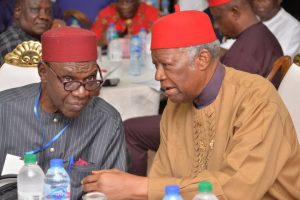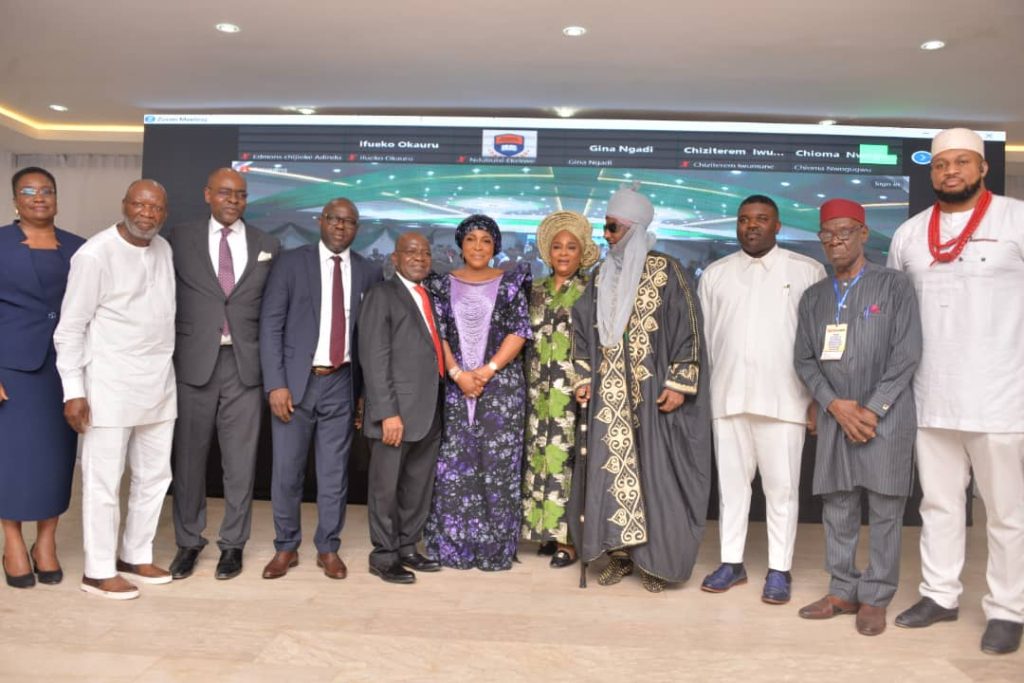…Say there’s hope for Abia
Stephen Ukandu, Umuahia
Former Governor of the Central Bank of Nigeria, Khaleefa Muhammad Sanusi; former Minister for Finance, Kalu Idika Kalu; former Military Administrator of Old Imo State, General Ike Nwachukwu (retd); and the former Director-General of Securities and Exchange Commission, Ms Arunma Oteh, were among the dignitaries that stormed Abia State on Thursday for the formal inauguration of the Abia State Global Economic Advisory Council.
The 19-member council is co-chaired by Sanusi, Oteh, and an investment guru, Bolaji Balogun.
Some members of the Council include: Director General of the World Trade Organization, Dr Ngozi Okonjo-Iweala; and the President and Chairman of Board of Directors of Afrexim Bank Dr. Benedict Oramah, both of whom are to serve as Honorary Advisers.
In his speech entitled, “New Frontier of Excellence from Vision to Execution,” Gov. Otti said the Council would serve as a key advisory body, offering strategic insights and recommendations to guide the state’s economic and investment policies.
He said his intention was to make Abia a major investment destination in Africa.
According to him, the Council “will collaborate closely with the relevant State Commissioners to address the unique challenges and opportunities that lie ahead, ensuring that Abia State remains at the forefront of innovation and economic development within the region and globally.”
Otti said he came on board to change the narrative and lay a foundation for a New Abia, saying that the new dawn had begun.
“Our programmes are already re-positioning and rebuilding Abia State as the economic pride of Nigeria. Therefore, it is essential to ensure that its economic development strategy is founded not only on a thorough understanding of the local economic environment but also on the dynamics of the emerging forces now shaping the future of the global economy.
“The newly appointed members bring a wealth of experience and expertise in various sectors, enhancing the diversity and dynamism of the Abia State Global Economic Advisory Council. Their collective knowledge will play a pivotal role in shaping policies that drive innovation, attract investments, form solid partnerships, and ensure the overall economic resilience of our great state,” the statement declared.
Otti promised to respect and implement the advice of the Council for the good of the state, and thanked the members for obliging to serve the state.
“You already know what we want to accomplish: making Abia a preferred investment destination for global businesses as I pointed out in my New Year message. Your job as members of this Council is to work closely with the State Government to create practical ways of moving from the vision board to the field of execution, providing intelligent answers to questions around how we can open up the State to those seeking to put their money in an environment where steady returns are assured; in ways that profit the investors themselves, the local economy and ultimately, impact the long term economic prospects of the State.
“We are not just seeking to attract a few big manufacturing outfits in the State to score cheap political points. No. Our ultimate goal is to re-make the entire State into a robust enterprise ecosystem with clear pathways to bigger global and regional markets. We are keen to transform our traditional agro-economy to become a major player in the global agricultural value chain, producing sufficient output to feed the local population and then for export. We did it in the 1950s and early 1960s with crude technology and under-developed supply chain; I believe we can do even better in the 21st century with all the amazing opportunities it promises.”
In a remark, Sanusi predicted a very bright future for Abia State, saying that one of the state’s advantages ” is having a Governor with intellectual capacity.”
He recalled Otti’s exploits and innovations in the banking sector, saying that with him on the driver’s seat, a New dawn had begun in Abia.
Sanusi regretted that the Federal Government due to lack of good economic policies, frustrates good efforts of some states to attract investors.
He , therefore, urged Governors, as members of the National Economic Council, to advise the Government at the centre “to pursue sensible policies” that would make the macro-economy attractive to investors.
“Sub- nationals are having difficulties because of what is happening at the Centre. Investors look at the macro economy and they turn away.”
Sanusi, expressed faith that considering Gov. Otti’s pedigree and track records of achievements, Abia would witness tremendous transformation and economic boom in the years ahead.
He, however, tasked the Governor to be ready to heed and implement the advice by the Council, noting that the challenge of leadership in Nigeria has been poor implementation of policies.
In her speech, Ms Oteh said the cream of members of the Council was an indication that the Governor assembled them not just to advise him but to hold him accountable for the people.
She promised to bring to bare, her wealth of experience and global connections to help move the state forward.
Oteh also applauded the Governor for his achievements so far.
Speaking also, Balogun said that Abia is blessed with abundant human and material resources, which if properly harnessed, would place the state on the path of greatness.
“Abia has valuable minerals needed in the world. Abia is blessed with talent economy. It has digital and creative economy plus sports stars.”

In his remark, former Minister for Finance and an elder statesman, Kalu Idika Kalu, harped on the need to rebuild infrastructure and manpower of the state.
He expressed joy over Otti’s move to set up the Council, saying that Otti had started what they had wanted to do in the Old Imo State.
The renowned Economist also commended Otti for his achievements so far, and pledged to contribute towards re-inventing the state.
Gen. Nwachukwu (retd.), expressed joy that the New Abia they had dreamed of, and worked for, had finally begun.
He said that Otti had started on the right path towards the development of the state.

